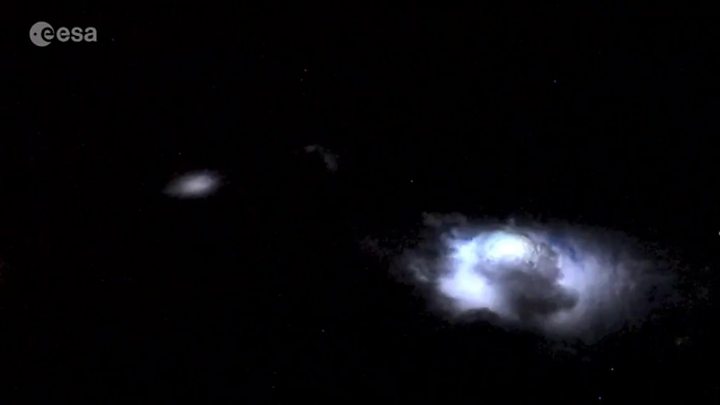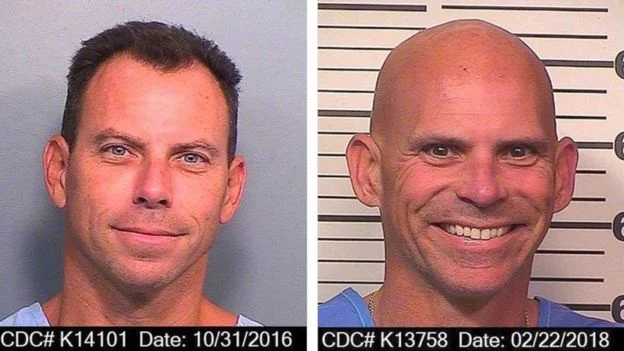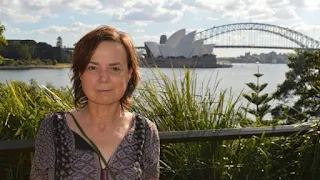Thunderstorms are some of the most spectacular events in nature, yet what we can see from the surface of our planet is only the beginning.
There are bizarre goings on in Earth's upper atmosphere, and a new mission aims to learn more about them.
Launched to the International Space Station on Monday, the Atmosphere-Space Interactions Monitor (ASIM) will observe the strange electrical phenomena that occur above thunderstorms.
Sky lab
Orbiting at an altitude of just over 400km, the ISS provides the perfect view of Earth's turbulent weather systems.
ASIM will be deployed aboard the station later this month.
The electrifying effects of storms are frequently observed from the space station.
Yet when lightning strikes downward, something very different is happening above the cloud tops.
Known as Transient Luminous Events (TLEs), these unusual features were first spotted by accident in 1989.
Minnesota professor John R Winckler was testing a television camera in advance of an upcoming rocket launch, when he realised that two frames showed bright columns of light above a distant storm cloud.
Sprites, elves and jets
So, what's causing these events?
"They are slightly different to lightning," Dr Neubert told BBC News. "It's a pulse of the electric field that travels up. For the sprite - when the atmosphere gets thin, the field can get a discharge."
Sprites appear milliseconds after a powerful cloud-to-ground lightning strike.
Elves, on the other hand, are caused by the electromagnetic pulse the strike produces. A brief, aurora-like expanding halo in the ionosphere, they occur too quickly to be spotted by the human eye and last less than a millisecond.
Although they are more elusive, "elves are incredibly well understood," says Dr Martin Fullekrug from the University of Bath.
They are the most common TLE, thought to occur twice as often as sprites
Blue jets - upward electrical discharges from cloud tops - are the least well known.
"The jets are not very well studied because they're very faint. They're mainly blue. Also they're not necessarily associated with lightning. They pop up now and again and they're very mysterious," Dr Fullekrug added.
While elves are mainly spotted over warm ocean waters, sprites tend to occur over land.
North America, the Democratic Republic of the Congo and South Africa are all good places to see them.

"In Britain we also have [these storms] from time to time," explained
Dr Fullekrug. "We're conducting research on one that happened in May last year. It produced a wonderful sequence of sprites [over Cornwall]."
Dr Fullekrug. "We're conducting research on one that happened in May last year. It produced a wonderful sequence of sprites [over Cornwall]."
The sprites were spotted by meteor observers, who had cameras trained on the sky to follow the trails of shooting stars.
Stormchasing from space
ASIM's main goals are to study the physics of TLEs, and the characteristics of thunderstorms that produce them.
The payload includes two cameras, which can capture 12 frames per second,
plus X-ray and gamma ray detectors.
plus X-ray and gamma ray detectors.
This will allow the international team of researchers, for many of whom this is the culmination of decades of work, to determine where in the cloud sprites or jets
originate.
originate.
With the aid of the European Space Agency, ASIM's minimum mission length is two years.
During this period, it is expected to
observe a minimum of one TLE per day, although it is thought that they occur
at least every minute, somewhere in the world.
observe a minimum of one TLE per day, although it is thought that they occur
at least every minute, somewhere in the world.
For Dr Neubert, this will be an incredibly exciting time.
"We don't really know what's inside lighting. It happens so fast and it's so dangerous... it's hard to get to the real inside physics," he said.
In the thin upper atmosphere, TLEs are larger and easier to measure.
"To me," he added, "they represent a window to the inside of lightning."































